
Peter Henry Fonda was an American actor, film director, and screenwriter. He was a two-time Academy Award nominee, both for acting and screenwriting, and a two-time Golden Globe Award winner for his acting. He was a member of the Fonda acting family, as the son of actor Henry Fonda, the brother of actress and activist Jane Fonda, and the father of actress Bridget Fonda.

The Fall of the Roman Empire is a 1964 American epic historical drama film directed by Anthony Mann and produced by Samuel Bronston, with a screenplay by Ben Barzman, Basilio Franchina and Philip Yordan. The film stars Sophia Loren, Stephen Boyd, Alec Guinness, James Mason, Christopher Plummer, Mel Ferrer, and Omar Sharif.

Thomas Lee Kirk was an American actor, best known for his performances in films made by Walt Disney Studios such as Old Yeller, The Shaggy Dog, Swiss Family Robinson, The Absent-Minded Professor, and The Misadventures of Merlin Jones, as well as the beach party films of the mid-1960s. He frequently appeared as a love interest for Annette Funicello or as part of a family with Kevin Corcoran as his younger brother and Fred MacMurray as his father.
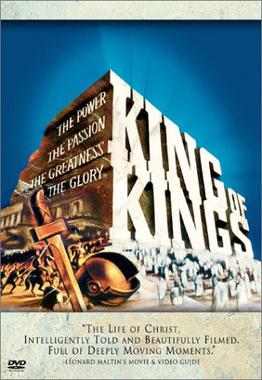
King of Kings is a 1961 American epic religious film directed by Nicholas Ray and produced by Samuel Bronston for Metro-Goldwyn-Mayer. Adapted from the New Testament, the film tells the story of Jesus of Nazareth from his birth and ministry to his crucifixion and resurrection. It stars Jeffrey Hunter as Jesus, with Siobhán McKenna, Robert Ryan, Viveca Lindfors, Ron Randell, Hurd Hatfield, and Rip Torn and is narrated by Orson Welles.
Martin Nelson Ransohoff was an American film and television producer, and member of the Ransohoff family.

Deborah Walley was an American actress noted for playing the title role in Gidget Goes Hawaiian (1961) and appearing in several beach party films.
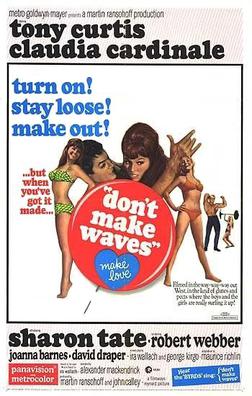
Don't Make Waves is a 1967 American sex comedy starring Tony Curtis, Claudia Cardinale, Dave Draper and Sharon Tate. Distributed by Metro-Goldwyn-Mayer, the film was directed by Alexander Mackendrick and is based on the 1959 novel Muscle Beach by Ira Wallach, who also co-wrote the screenplay.

7 Faces of Dr. Lao is a 1964 American Metrocolor Western fantasy-comedy film directed by George Pal and starring Tony Randall. The film, an adaptation of the 1935 novel The Circus of Dr. Lao by Charles G. Finney adapted for the screen by Charles Beaumont, details the visit of a magical circus to a small town in the southwestern United States and its effects on the townspeople.
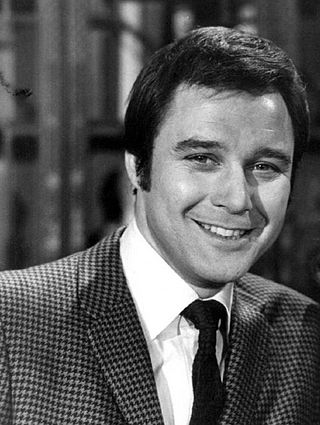
Michael Callan, sometimes known as Mickey Collins, was an American actor best known for originating the role of Riff in West Side Story on Broadway, and for his film roles for Columbia Pictures, notably Gidget Goes Hawaiian, The Interns and Cat Ballou.
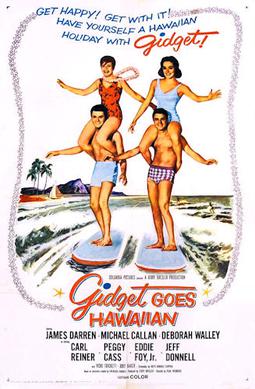
Gidget Goes Hawaiian is a 1961 American romantic comedy musical film starring James Darren, Michael Callan and Deborah Walley. Released by Columbia Pictures, the film is a sequel to the 1959 Sandra Dee beach film vehicle Gidget. Dee was under contract to Universal for the rival series film Tammy Tell Me True (1961) and would not be released to Columbia to reprise her hit role.

Peter James Yates was an English film director and producer. He was known for making films in a wide variety of genres, including the Steve McQueen police thriller film Bullitt in 1968. He received nominations for four Academy Awards, three BAFTA Awards, and two Golden Globe Awards.
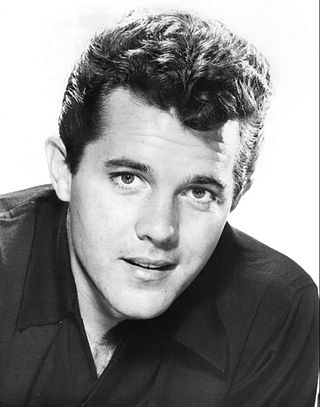
John Ashley was an American actor, producer and singer. He was best known for his work as an actor in films for American International Pictures, producing and acting in horror films shot in the Philippines, and for producing various television series, including The A-Team.

Parrish is a 1961 American drama film made by Warner Bros. It was written, produced and directed by Delmer Daves, based on Mildred Savage's 1958 novel of the same name. The music score was by Max Steiner, the Technicolor cinematography by Harry Stradling Sr., the art direction by Leo K. Kuter and the costume design by Howard Shoup. The film stars Troy Donahue, Claudette Colbert, Karl Malden, Dean Jagger, Connie Stevens, Diane McBain, Sharon Hugueny, Sylvia Miles, Madeleine Sherwood and Hayden Rorke.

Diane Jean McBain was an American actress who, as a Warner Brothers contract player, reached a brief peak of popularity during the early 1960s. She was best known for playing an adventurous socialite in the 1960–1962 television series Surfside 6 and as one of Elvis Presley's leading ladies in 1966's Spinout.
Dance of the Dwarfs is a 1983 American horror adventure film directed by Gus Trikonis and starring Peter Fonda and Deborah Raffin. It is based on the 1968 novel of the same name by Geoffrey Household.

In the Cool of the Day is a 1963 British-American romantic drama film released by Metro-Goldwyn-Mayer in Metrocolor and Panavision. The film is directed by Robert Stevens and starring Peter Finch, Jane Fonda, Angela Lansbury, Arthur Hill, and Constance Cummings; with Nigel Davenport, and John Le Mesurier.
Steven Henry Scheuer was a film and television historian and critic. He edited Movies on TV published between 1958 and 1993 and wrote The Movie Book (1974), subtitled A Comprehensive, Authoritative, Omnibus Volume on Motion Pictures and the Cinema World. He was moderator of the syndicated television series All About TV from 1969 to 1990. In 2002, he hosted and produced a 13-program series for public television, Television in America: An Autobiography.

Your Cheatin' Heart is a 1964 American fictionalized biographical-musical directed by Gene Nelson and starring George Hamilton as country singer Hank Williams. It co-stars Susan Oliver and Red Buttons.
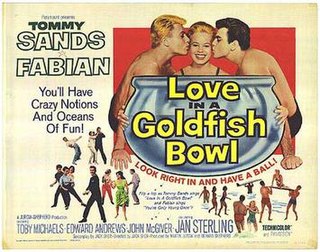
Love in a Goldfish Bowl is a 1961 teen film directed by Jack Sher starring singing idols Tommy Sands and Fabian.

Sharon Elizabeth Hugueny was an American actress who had a brief film and television career during the 1960s, appearing in 19 TV episodes and four feature films. The last gave her a co-starring role alongside Peter Fonda in 1964 as one of the title characters in The Young Lovers. Other than a single TV guest shot, she had been away from the cameras for nearly a decade, when an attempted return to filmmaking was cut short by a crippling automobile accident in 1977.

















